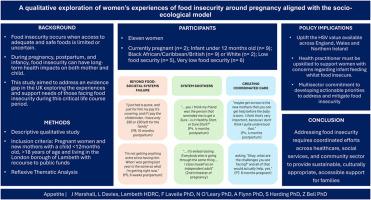对妇女在怀孕期间的粮食不安全经历进行定性探索,与社会生态模型保持一致
IF 3.8
2区 医学
Q1 BEHAVIORAL SCIENCES
引用次数: 0
摘要
妊娠期、产后和婴儿期是粮食不安全(即无法获得充足、安全和营养的食物)对孕产妇和儿童健康产生不利影响的关键时期。尽管英国的FI率很高,但人们对这一时期女性的经历知之甚少。本研究探讨了多民族妇女孕期和产后的FI。在2023年10月至2024年2月期间,对有目的地抽样的粮食不安全个体(18岁,怀孕或产后12个月,居住在伦敦南部,依靠公共资金)进行了半结构化访谈。人口统计数据用SPSS进行分析,访谈用NVivo的反身性主题分析。根据社会生态模型对研究结果进行了讨论。从11个访谈中产生了三个关键主题。1)社会系统失败及其营养影响,2)系统“安抚”减轻FI, 3)创建协调护理。主题一描述了影响母亲食物策略、饮食和喂养行为的结构性驱动因素。主题二探讨保护或阻碍妇女获得支持的因素。主题三讨论了改善保健和社会保健协调以解决怀孕期间感染的好处和机会。本研究强调了结构性决定因素如何加剧妊娠期和产后FI,这一生命周期的独特结构性驱动因素加剧了其影响。尽管有丰富的烹饪和食物管理策略,FI仍然影响健康饮食。迫切需要加强协调护理,以解决FI问题,促进健康饮食,并改善可及性。本文章由计算机程序翻译,如有差异,请以英文原文为准。

A qualitative exploration of women's experiences of food insecurity around pregnancy aligned with the socio-ecological model
Pregnancy, postpartum, and infancy are pivotal periods when food insecurity (FI), defined as inconsistent access to sufficient, safe, and nutritious food, can adversely impact maternal and child health. Despite high FI rates in the UK, little is known about women's experiences during this time. This study explores FI during pregnancy and postpartum amongst a multi-ethnic group of women. Between October 2023 and February 2024 semi-structured interviews were conducted with purposively sampled food-insecure individuals (>18 years, pregnant or postpartum <12 months, residing in South London with recourse to public funds). Demographics were analysed with SPSS, and interviews using Reflexive Thematic Analysis in NVivo. Findings were discussed in alignment with the socio-ecological model. Three key themes were generated from eleven interviews. 1) Societal systems failure and its nutritional impact, 2) System ‘soothers’ mitigating FI, and 3) Creating Coordinated Care. Theme one describes the structural drivers' influencing maternal food strategies, eating and feeding behaviours. Theme two explores factors protecting or inhibiting women access to support. Theme three discusses the benefits and opportunities for improved health and social care coordination to address FI during pregnancy. This study emphasizes how structural determinants exacerbate FI during pregnancy and postpartum, with unique structural drivers to this life course period worsening its impact. FI influences health eating despite resourceful cooking and food management strategies. Greater coordinated care is urgently needed to address FI, promote healthy diets, and improve access.
求助全文
通过发布文献求助,成功后即可免费获取论文全文。
去求助
来源期刊

Appetite
医学-行为科学
CiteScore
9.10
自引率
11.10%
发文量
566
审稿时长
13.4 weeks
期刊介绍:
Appetite is an international research journal specializing in cultural, social, psychological, sensory and physiological influences on the selection and intake of foods and drinks. It covers normal and disordered eating and drinking and welcomes studies of both human and non-human animal behaviour toward food. Appetite publishes research reports, reviews and commentaries. Thematic special issues appear regularly. From time to time the journal carries abstracts from professional meetings. Submissions to Appetite are expected to be based primarily on observations directly related to the selection and intake of foods and drinks; papers that are primarily focused on topics such as nutrition or obesity will not be considered unless they specifically make a novel scientific contribution to the understanding of appetite in line with the journal's aims and scope.
 求助内容:
求助内容: 应助结果提醒方式:
应助结果提醒方式:


